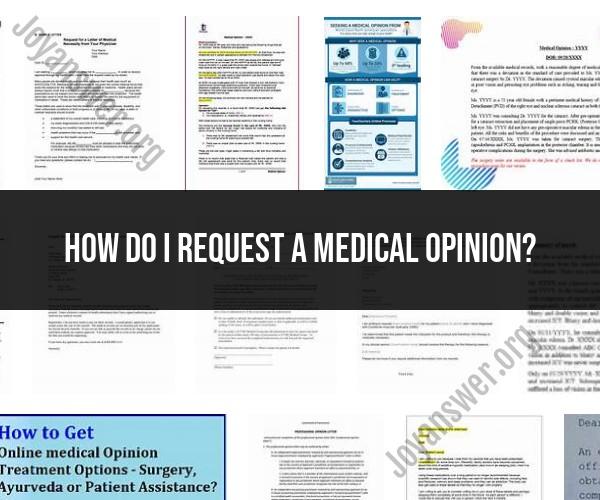How do I request a medical opinion?
When seeking a medical expert's opinion or consultation, it's important to approach the request professionally and respectfully. Whether you are a patient seeking a second opinion, a healthcare provider seeking input from a specialist, or a researcher seeking expert advice, here's a guide on how to request a professional medical opinion effectively:
Identify the Specialist: Determine the specific type of medical specialist you need for your query. Different medical conditions require expertise from different specialists (e.g., cardiologist, oncologist, neurologist, etc.).
Contact Information: Ensure you have the correct contact information for the medical specialist or their office. This may include an email address, phone number, or an online portal for inquiries.
Compose a Professional Email or Letter:
- Salutation: Start with a respectful salutation, addressing the specialist by their appropriate title (e.g., Dr. Smith).
- Begin by introducing yourself or your organization, explaining your role or relationship to the medical query. Be concise and clear.
- Explain the Purpose: Clearly state the purpose of your request. Explain why you are seeking the specialist's opinion and what specific questions or concerns you have.
Provide Context: Offer relevant background information about the patient (if applicable), including medical history, current symptoms or conditions, and any previous treatments or diagnoses. Be as detailed as possible without overwhelming the specialist with unnecessary information.
Ask Specific Questions: Formulate your questions or requests concisely and clearly. Ask for the specialist's professional opinion on the matter at hand. Bullet points or numbered questions can help make your queries more readable.
Attach Relevant Documents: If you have medical records, test results, or other documents that support your request or provide additional context, attach these as PDFs or shareable files. Ensure the specialist can access them easily.
Express Respect and Appreciation: Show gratitude for the specialist's time and expertise. Acknowledge their busy schedule and express your appreciation for their assistance.
Propose a Follow-up Plan: If applicable, suggest a preferred mode of communication for the specialist's response (e.g., email, phone call, video conference). Mention your availability for follow-up discussions or appointments.
Provide Contact Information: Include your contact information, including your email address and phone number, in case the specialist needs to reach out for further clarification.
Closing: Use a professional closing (e.g., "Sincerely" or "Best regards") followed by your name and any relevant affiliations or credentials.
Review and Proofread: Before sending the email or letter, review it for clarity, accuracy, and professionalism. Ensure there are no typographical errors or unclear statements.
Follow Up: If you don't receive a response within a reasonable time frame (usually a few weeks), consider sending a polite follow-up email or making a phone call to inquire about the status of your request.
Remember that medical specialists are often busy, so being clear, concise, and respectful in your request is crucial. Additionally, respecting patient privacy and obtaining appropriate consent for sharing medical information is essential when requesting a medical opinion on behalf of someone else.













